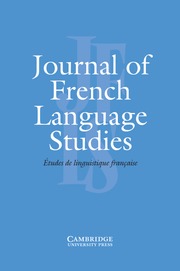Crossref Citations
This article has been cited by the following publications. This list is generated based on data provided by
Crossref.
Myers, James
and
Li, Yingshing
2009.
Lexical frequency effects in Taiwan Southern Min syllable contraction.
Journal of Phonetics,
Vol. 37,
Issue. 2,
p.
212.
Bürki, Audrey
Ernestus, Mirjam
and
Frauenfelder, Ulrich H.
2010.
Is there only one “fenêtre” in the production lexicon? On-line evidence on the nature of phonological representations of pronunciation variants for French schwa words.
Journal of Memory and Language,
Vol. 62,
Issue. 4,
p.
421.
Bürki, Audrey
Alario, F. Xavier
and
Frauenfelder, Ulrich H.
2011.
Lexical representation of phonological variants: Evidence from pseudohomophone effects in different regiolects.
Journal of Memory and Language,
Vol. 64,
Issue. 4,
p.
424.
Bürki, Audrey
Ernestus, Mirjam
Gendrot, Cédric
Fougeron, Cécile
and
Frauenfelder, Ulrich Hans
2011.
What affects the presence versus absence of schwa and its duration: A corpus analysis of French connected speech.
The Journal of the Acoustical Society of America,
Vol. 130,
Issue. 6,
p.
3980.
2011.
The Handbook of Phonological Theory.
p.
779.
Chetail, Fabienne
and
Content, Alain
2013.
Segmentation of Written Words in French.
Language and Speech,
Vol. 56,
Issue. 1,
p.
125.
Chabanal, Damien
Liégeois, Loïc
and
Chanier, Thierry
2015.
Acquisition de la variation phonologique et recueil de corpus d’interactions naturelles parents-enfants : nouvelle méthode, nouveaux enjeux.
Lidil,
p.
65.
Racine, Isabelle
Durand, Jacques
and
N. Andreassen, Helene
2016.
PFC, codages et représentations : la question du schwa.
Corpus,
Bayles, Andrew
Kaplan, Aaron
and
Kaplan, Abby
2016.
Inter- and intra-speaker variation in French schwa.
Glossa: a journal of general linguistics,
Vol. 1,
Issue. 1,
Byers, Emily
and
Yavaş, Mehmet
2016.
Durational variability of schwa in early and late Spanish–English bilinguals.
International Journal of Bilingualism,
Vol. 20,
Issue. 2,
p.
190.
Eunmee Park
2016.
Caractéristiques phonologiques dans le sud de France.
ASSOCIATION CULTURELLE FRANC0-COREENNE,
Vol. null,
Issue. 33,
p.
1.
Chetail, Fabienne
and
Content, Alain
2017.
The perceptual structure of printed words: The case of silent E words in French.
Journal of Memory and Language,
Vol. 97,
Issue. ,
p.
121.
Byers, Emily
Yavas, Mehmet
and
Howell, Peter
2017.
Vowel reduction in word-final position by early and late Spanish-English bilinguals.
PLOS ONE,
Vol. 12,
Issue. 4,
p.
e0175226.
JANSEN, LUISE
2018.
Remake cinématographique, remake phonologique ? La (non-)réalisation du schwa dansMarius1931 et 2013.
Journal of French Language Studies,
Vol. 28,
Issue. 3,
p.
377.
Bürki, Audrey
Viebahn, Malte C.
Racine, Isabelle
Mabut, Cassandre
and
Spinelli, Elsa
2018.
Intrinsic advantage for canonical forms in spoken word recognition: myth or reality?.
Language, Cognition and Neuroscience,
Vol. 33,
Issue. 4,
p.
494.
Bürki, Audrey
2018.
Variation in the speech signal as a window into the cognitive architecture of language production.
Psychonomic Bulletin & Review,
Vol. 25,
Issue. 6,
p.
1973.
Eychenne, Julien
2019.
On the deletion of word-final schwa in Southern French.
Phonology,
Vol. 36,
Issue. 3,
p.
355.
Pustka, Elissa
2019.
Sibilant-stop onsets in Romance: Explaining phonotactic complexity
.
Folia Linguistica,
Vol. 53,
Issue. s40-s1,
p.
61.
Hutin, Mathilde
Jatteau, Adèle
Vasilescu, Ioana
Lamel, Lori
Adda-Decker, Martine
Neveu, F.
Harmegnies, B.
Hriba, L.
Prévost, S.
and
Steuckardt, A.
2020.
Le schwa final en français standard est-il un « lubrifiant phonétique » ?.
SHS Web of Conferences,
Vol. 78,
Issue. ,
p.
09004.
TSAKNAKI, OLYMPIA
and
VALETOPOULOS, FREIDERIKOS
2021.
Au croisement des cultures, des discours et des langues. Cent ans d’études romanes a l’Université de Varsovie (1919–2019). Tome II: Linguistique et Didactique du FLE.


